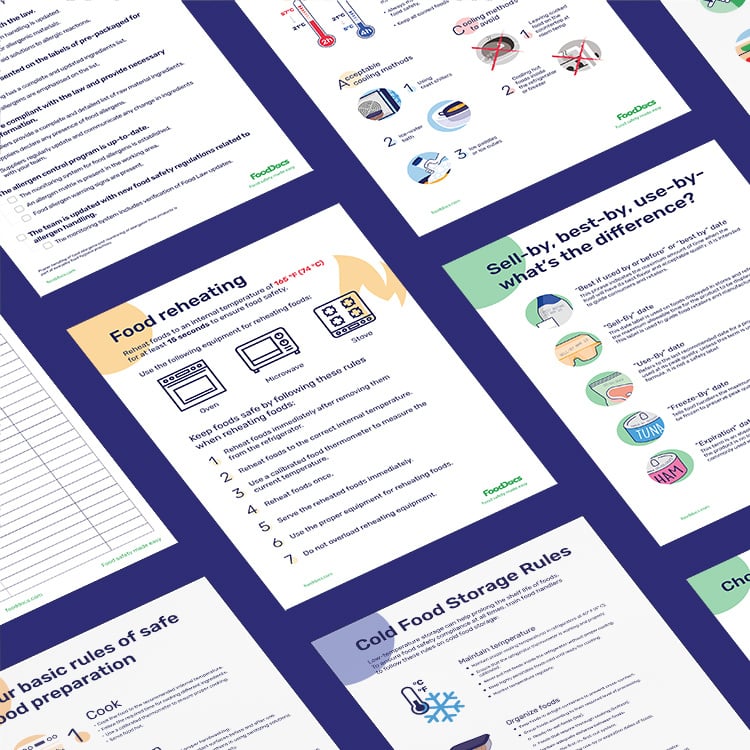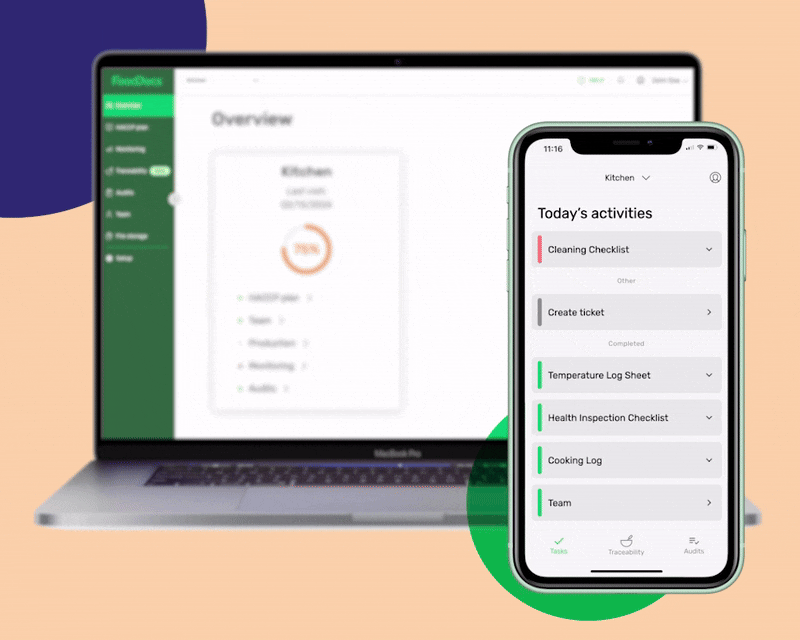Mastering Restaurant Sanitizing: Best Practices for Kitchens and Dining Areas
Master restaurant sanitizing with clear steps for kitchens and dining areas. Learn methods, checklists, and procedures to keep your team safe and...
Running a restaurant is like conducting an orchestra.
Behind each plated dish, there’s a system of planning, coordination, and control. This system is known as restaurant management, which involves overseeing daily operations, business strategy, staff performance, customer service, and finances in foodservice establishments (and using tools to make it all easier).


Thank you for downloading ebook!
Want to get a customizable HACCP template?
Or set up your food safety system in 15 minutes?
In practice, restaurant management ties together all sections of the business, ensuring that the kitchen, dining room, and back-office functions work in harmony. It involves monitoring everything from profit margins and restaurant food safety to quality standards and brand reputation.
Especially today, when consumers' awareness of safety is at an all-time high, effective restaurant management is more critical than ever.
Modern restaurant operators face challenges, including:
It is the restaurant manager’s responsibility to keep each area of the establishment running safely and efficiently despite these pressures.
The following guide shares free restaurant resources that you can download and start using as soon as your next shift, defines what restaurant management entails and provides actionable tips on how to improve restaurant management practices.

We also explore restaurant management tips for daily success, discuss how to reduce food costs in restaurant management to boost your bottom line.
Restaurant management is the coordination of people, systems, and operations to keep a foodservice business running smoothly.
Effective management improves food safety, customer satisfaction, staff performance, and profitability.
Modern managers rely on connected tools like POS, inventory, and compliance software to streamline operations.
A restaurant manager’s core duties include leading the team, overseeing operations, and ensuring compliance.
Great managers avoid micromanaging and fix root problems, not just symptoms.
Tracking KPIs like food cost %, labor %, and turnover helps make smarter business decisions.
To improve management, identify weak points, set goals, and train your team consistently.
Reducing food cost depends on portion control, tight inventory, and well-trained staff.
Choosing tools that integrate across systems saves time and improves consistency.
Clear goals, daily structure, and food safety culture are the foundation of effective restaurant management.
Restaurant managers wear many hats. Their job isn’t to cook or serve every plate, but to make sure every part of the operation works together. Here are their core responsibilities:

Great managers also know what to avoid. These behaviors undermine team performance and burn out leaders.

Balancing what to own and what to delegate is one of the biggest signs of leadership maturity in restaurant management.
Restaurant managers are the main directors of a food business operation. They oversee operations from cleaning and sanitation rules to cooking, accounting, monitoring, and serving in a restaurant. The many responsibilities of a restaurant manager make the task demanding and require a lot of patience from an individual.
Restaurant managers are tasked with supervising the following responsibilities in a food service establishment:
The responsibilities of a restaurant manager can go further beyond the listed information. In some cases, the responsibilities can be shared between department heads, but coordination will be done by a supervising individual.

A well-managed restaurant doesn’t happen by luck but by the result of clear leadership and organized systems. Proper management provides structure and accountability that benefit every aspect of the business.
For food safety leaders and operations managers, the stakes are high: any lapse in process can risk customer health or profits.
Danny Meyer
CEO
Union Square Hospitality Group
Effective restaurant management ensures the following:
A restaurant business will struggle to survive without good management. Investing in strong managerial practices is not optional; it’s a necessity to ensure food safety, compliance, and the overall performance of the company.
Modern restaurant management often involves digital tools to streamline communication, scheduling, and record-keeping. Many restaurants are adopting software for tasks like inventory tracking, temperature monitoring, and training to improve efficiency.
These tools help managers ensure that all team members stay on the same page and that critical tasks are completed consistently. Embracing technology not only saves time but also provides real-time data that managers can use to make informed decisions.

Leadership might be the first thing that comes to mind when you think of restaurant management. But it’s also about using the right tools to run operations efficiently. Depending on your concept, budget, and complexity, different systems may be required to support consistent service, compliance, and profitability.
They can include:
| System type | What it helps manage |
|---|---|
|
POS system |
Sales tracking, order flow, payment processing |
|
Inventory software |
Food usage, waste control, supplier orders |
|
Labor and scheduling tools |
Staffing, shift efficiency, payroll prep |
|
Food safety software |
HACCP logs, cleaning checklists, temp checks |
|
CRM or guest management |
Loyalty, reservations, feedback, marketing |
Using connected systems gives restaurant managers clearer oversight and saves time spent on manual processes.

Restaurant managers may have different personal styles, but there are core best practices common to every successful operation. Below is a list of fundamental restaurant management tips that can help improve daily operations and team performance:
Secure all required permits and adhere to local health codes and safety regulations.
Staying compliant with laws (business licensing, food safety standards, labor rules, etc.) establishes a strong foundation for your restaurant. Regularly review compliance checklists and inspection reports to prevent any violations.
Unite your team under a clear mission and well-defined objectives. Communicate these goals to your staff and delegate tasks so everyone understands their responsibilities and daily targets.
Strong communication ensures that each employee knows what is expected, reducing confusion and missteps during service.
Make food safety a core value of your restaurant. Train every team member on safe food handling, cleaning, and sanitation procedures, and lead by example. Emphasize the importance of keeping food safe in daily routines, from proper handwashing to avoiding cross-contamination, so that safety becomes second nature.
Prioritizing food safety culture will help ensure you prevent risks before they become problems.
Lydia Castro
Co-Founder
Acamaya
Invest time in recruiting skilled, dependable staff and give them thorough training. Clearlby define each employee’s role and performance standards during training.
When your team is competent and understands exactly what to do, day-to-day operations become more self-sufficient. Continually coach your staff and provide feedback to help them grow.
A hands-on approach to oversight keeps standards high. Each day, walk through both front-of-house and back-of-house areas to observe service, food prep, and cleanliness. Use checklists or digital task logs to ensure critical activities (opening/closing duties, food temperature checks, cleaning schedules) are completed on time.
Regular monitoring and verification help catch small issues (like a missed sanitizer bucket or slow table turn) before they escalate.
Keep a close eye on your restaurant’s finances by managing food costs and inventory. Track your Cost of Goods Sold (CoGS) and review key expenses frequently. Plan the menu strategically. This could look like analyzing which dishes are most profitable and which are dragging your margins. Adjust recipe portions or pricing if needed to maintain a healthy food cost percentage.
Likewise, manage your inventory tightly: order the right quantities, store everything properly, and reduce waste. Small tweaks in ordering and portioning can significantly improve profitability.
Don’t rely solely on pen-and-paper in a modern restaurant. Use restaurant management software and apps to streamline labor scheduling, inventory counts, and food safety logs. A good POS system, for example, can track sales and inventory in real time and help with automating reports.
Digital solutions (from automated temperature sensors and food safety monitoring to online training platforms) save time and reduce human error, freeing you up to focus on critical decisions.
Michael Worbanski
Human Resources and Operations Safety Specialist
Gruppo Terroni
The foodservice industry evolves quickly, so successful managers continuously seek ways to improve. Stay up to date with restaurant industry trends and be willing to adapt your strategies, whether it’s updating the menu based on customer preferences or adopting a new health guideline.
Collect and analyze data from your operations (sales patterns, customer feedback, waste logs) to identify areas for improvement. Cultivating an attitude of continuous improvement in yourself and your team will help your restaurant remain competitive and efficient.
Happy customers are repeat customers. Train your staff to provide friendly, attentive service, and lead by example in creating a welcoming atmosphere. When complaints or issues arise, address them promptly and professionally.
Use customer feedback as a tool for improvement because it can highlight weak spots in your service or offerings. Ensuring each guest has a positive experience will build a loyal customer base and a strong reputation in the community.
Even if you run a tight ship internally, attracting customers is key to success. Invest in marketing and advertising channels that reach your target audience. This could include social media marketing, local events, or loyalty programs.
Effective promotion builds your brand and keeps your restaurant visible. A steady influx of customers driven by good marketing efforts complements your operational excellence and drives growth.

These tips cover the broad responsibilities of restaurant management, from what restaurant management is at its core (compliance, people, processes) to the finer points of day-to-day leadership. Applying these practices can help create a well-run restaurant where food is safe, employees are engaged, and customers leave satisfied.
Restaurant management principles remain consistent across operations, but their application varies by scale. Single-location restaurants often require managers to be more hands-on, while multi-location operations rely heavily on systems, reporting, and delegation.
Regardless of size, successful restaurant management depends on clear processes, trained teams, and consistent oversight.
Improving restaurant management is an ongoing process of assessing and refining your operations. Even experienced managers should regularly ask: What can we do better?
Here are some steps to systematically improve restaurant management in your establishment:
Tom Colicchio
Celebrity Chef and Founder
Crafted Hospitality
Following these steps will help restaurant leaders drive a culture of continuous improvement. Remember that successful management is proactive: rather than waiting for problems to happen, great managers seek out ways to prevent issues and enhance performance.
Using modern management tools (analytics dashboards, food safety audit apps, etc.) can also make it easier to spot trends and opportunities for improvement. Over time, a cycle of regular evaluation and refinement will significantly strengthen your restaurant’s operations and business results.

Tracking restaurant KPIs helps managers understand if they’re operating efficiently and hitting their targets. Without clear metrics, you’re guessing. With them, you’re making data-backed decisions that protect margins and guest satisfaction.
| KPI | What it measures | Healthy range |
|---|---|---|
|
Food cost percentage |
Ingredient costs compared to food sales |
28-35%, depending on concept |
|
Labor cost percentage |
Staff wages compared to total revenue |
20-30% |
|
Table turnover rate |
How many times a table turns over during service |
3-5 per service (casual) |
|
Average check size |
Average guest spend per visit |
Varies (track growth trend) |
|
Customer satisfaction score |
Guest reviews and post-visit surveys |
Aim for 4.5 stars or above |
|
Employee turnover rate |
Rate of staff leaving within a time period |
<50% annually |
Don’t just look at results after-the-fact. Monitor leading indicators (like prep errors, line check failures, or skipped temp logs) to prevent issues before they hit guest satisfaction or costs.
Food cost is one of the largest expenses for any restaurant, and controlling it is a key part of effective restaurant management. According to the USDA, 30-40% of all food produced in the U.S. is wasted, which translates to about $161 billion lost every year. A significant portion of this waste comes from the restaurant industry, and all that wasted food directly hurts profitability.
The good news is that by setting cost control goals and making strategic changes in how you manage purchasing, preparation, and waste, you can noticeably improve your profit margins.
Below are some of the most impactful strategies on how to reduce food cost in restaurant management. They focus on smarter purchasing, better inventory control, and reducing waste without sacrificing quality:
How it reduces food cost: Track what ingredients come in, what sells, and what gets wasted. Closely monitoring inventory levels will allow you to avoid over-ordering and spoilage.
Using data and regular stock counts, managers can purchase just enough of each item, eliminating excess that would otherwise be thrown out. This ensures money isn’t tied up in unused stock.
How it reduces food cost: Analyze your recipes and portion sizes to make sure each dish is cost-effective. Adjust serving sizes if you find that plates consistently come back with leftovers (a sign portions are too large). Menu engineering helps identify which menu items are high-cost or low-margin so you can tweak recipes or prices accordingly.
If you want to reduce waste and maximize profit on each sale, you've got to be right-sizing portions and pricing strategically.
How it reduces food cost: Educate your kitchen team and servers about the impact of food waste on the business. Proper training ensures cooks follow recipes (preventing over-portioning) and handle ingredients correctly, while servers learn not to prepare garnishes or sides that customers tend to leave untouched.
When frontline staff understand food cost numbers and waste implications, they become more careful and help plug profit leaks. Regularly reinforce practices like first-in, first-out usage and careful prep to maintain a cost-conscious culture.
How it reduces food cost: Implement a strict FIFO method system for all storage. This means organizing your refrigerator and pantry so the oldest stock (first in) is used first, ensuring nothing expires unnoticed. Clearly label dates on all perishable items and train staff to rotate stock when new deliveries come in.
FIFO prevents the loss of ingredients due to spoilage, directly cutting down food cost by getting the full value out of what you’ve purchased.
How it reduces food cost: Reduce ingredient costs by negotiating with your food suppliers. Compare vendors and ask your current suppliers to price-match or offer discounts for loyal patronage. Buying in bulk can also lower unit prices, but be cautious with bulk orders and consider scheduling staggered deliveries to avoid spoilage of perishable goods.
Small restaurants can also consider joining group purchasing organizations to leverage collective buying power for lower prices on food items. Lower wholesale prices directly translate into improved food cost percentages.
When restaurants apply these strategies, they're able to significantly cut down on food cost and improve their overall profitability. Something as simple as better inventory tracking, for example, can reveal where ingredients are being wasted, allowing you to make adjustments that save money. Investing time in staff training pays off when employees take care to minimize waste and prevent costly mistakes.
Controlling food costs is essential to the financial health of your restaurant, and it often has side benefits: less waste also means a cleaner operation and a more sustainable business.
Sujan Sarkar
Michelin-Starred Chef and Co-Owner
Indienne Chicago
Controlling food cost requires consistent effort and attention to detail, but the payoff is worth it. As food cost percentages drop, you’ll notice the positive impact on your profit and loss statements.
Many cost-saving practices dovetail with quality improvement. Fresher inventory management, for example, means customers get more fresh ingredients on their plates, and portion control can lead to more consistent dining experiences. Cost control efforts support the broader goals of great restaurant management.
As one industry guide noted, implementing a combination of these strategies will help you start controlling food costs while also improving your restaurant’s operations.
Restaurant management demands attention to your people, products, processes, and profits all at once. For food safety leaders, executive chefs, and operations managers in U.S. restaurants, excelling in this role means never losing sight of the big picture while mastering the day-to-day details.
As long as you're setting clear goals, building a trained and safety-conscious team, and continuously monitoring both performance and costs, you'll create a restaurant that consistently delivers quality and stays financially healthy.
When you do, no matter what the foodservice industry throws new challenges your way (from labor shortages to stricter safety rules), strong leadership and smart use of the right technology stack will help make those challenges manageable.
At the end of the foodservice day, effective restaurant management is about consistency and continuous improvement. Doing the right things every day to ensure that your customers are happy, your food is safe, and your business is thriving. Lean into the strategies outlined above, and you’ll be well on your way to running a safer, more efficient, and more profitable restaurant operation.What's one critical component you need as part of your restaurant management ecosystem?
One of the largest areas where the attention of a restaurant manager goes is managing food safety compliance. This aspect of management requires constant monitoring. Failure to comply with set standards can lead to problems like causing a foodborne illness outbreak or reputation damage.
The best management system to get your task compliance done is FoodDocs' Restaurant Food Safety Software. You can try it free for 14 days.

To help you efficiently manage your food safety tasks, use FoodDocs' digital Food Safety Management System. Powered by artificial intelligence and a machine-learning program, our software features easy implementation and intuitive solutions.
If in case you are a restaurant manager or food business owner of a new and developing restaurant, you will need a food safety plan before starting operations. The most comprehensive plan that you can use is based on the Hazard Analysis Critical Control Point system.
Our digital solution at FoodDocs comes with a built-in digital HACCP plan builder that can generate a comprehensive food safety plan based on your business information in just 1 hour.
Customize the comprehensive digital HACCP plan so that you can get specific details tailored to your requirements.

Using our built-in digital HACCP plan, you can get a detailed food safety plan with the following components:
Fulfill one of the most critical tasks in food safety compliance within just 1 hour when you use our digital solution
Our digital solutions were built with food handlers and managers in mind and finding ways to make food safety compliance easier.
Find out more and experience how our software programs can help you achieve and maintain compliance fast. Start your 14-day free trial!
Here are some of our most popular restaurant resources to help keep it running smoothly:
Free restaurant checklists for a quick download
Learn everything about pest control in restaurants
Free restaurant cleaning checklist for a quick download
Free health inspection checklist for a quick download
Free checklist for restaurant opening and closing
Learn about restaurant food storage guidelines
Free PDF with food safety guidelines
List of the best restaurant softwares & tools
The number of managers in a restaurant can depend on the size of the food business. Some restaurants can have up to four managers, including general, restaurant, kitchen, and bar managers. In some establishments, only one manager can be responsible for the entire operation.
Ideally, a restaurant manager must have a degree related to hospitality and management. Most food service surveys indicate that a manager must have at least three to four years of experience in food service for better management performance.
Restaurant management requires the following skills.
A large restaurant usually has three levels of management: low-, mid-, and upper levels. The upper level includes company executives and owners. The middle-level management serves as the communicating manager between the upper and lower management. The lower-level managers are the front-line or on-site supervisors for a restaurant. The levels of the management system will vary on the size of the restaurant.
Master restaurant sanitizing with clear steps for kitchens and dining areas. Learn methods, checklists, and procedures to keep your team safe and...
Learn challenges healthcare foodservice teams face today and key food safety practices to protect vulnerable patients. Get a free healthcare leader...
Learn what Standard Operating Procedures (SOPs) are and how to write effective SOPs that ensure consistency, efficiency, and safety in your...